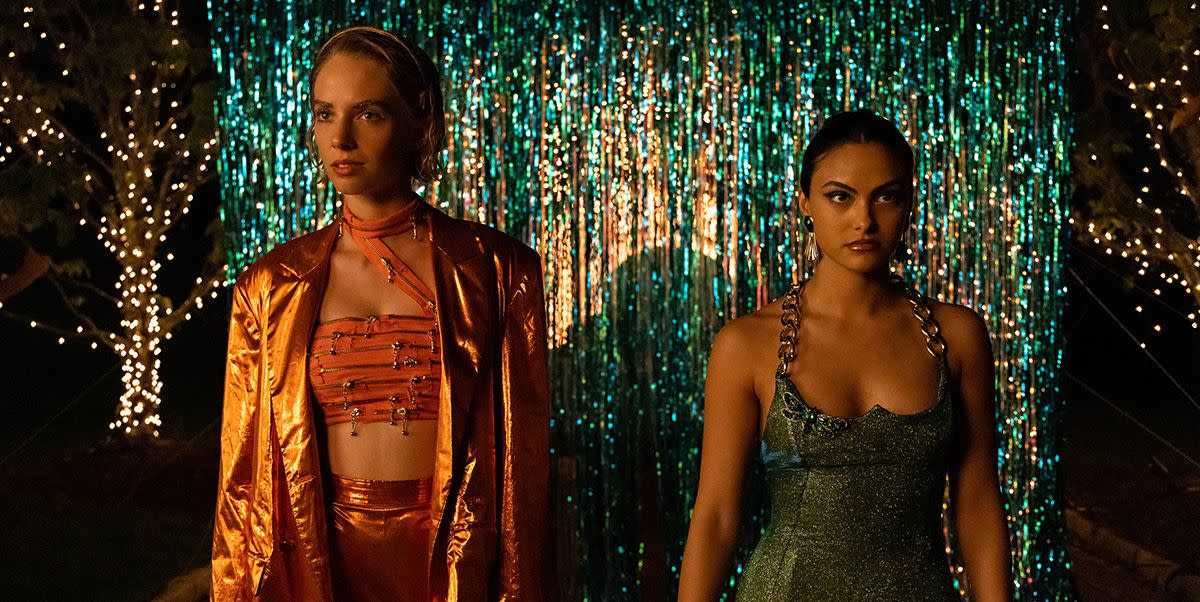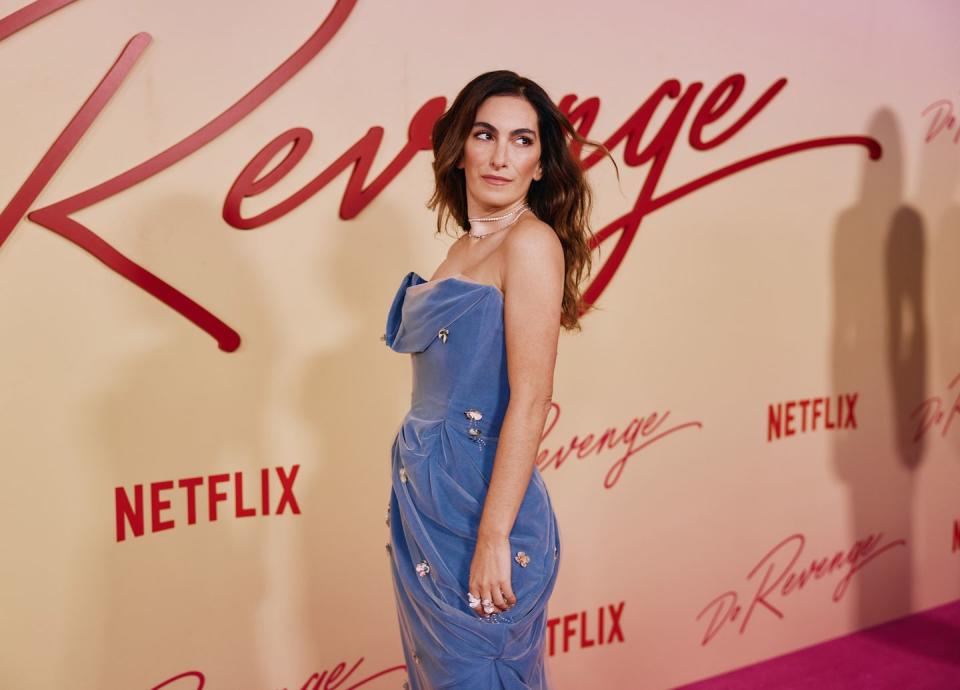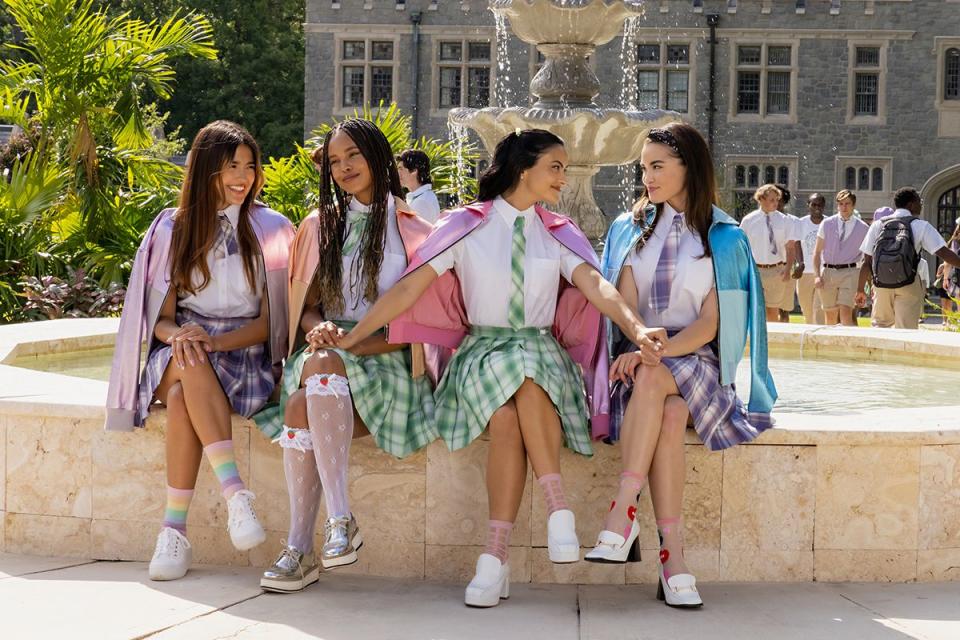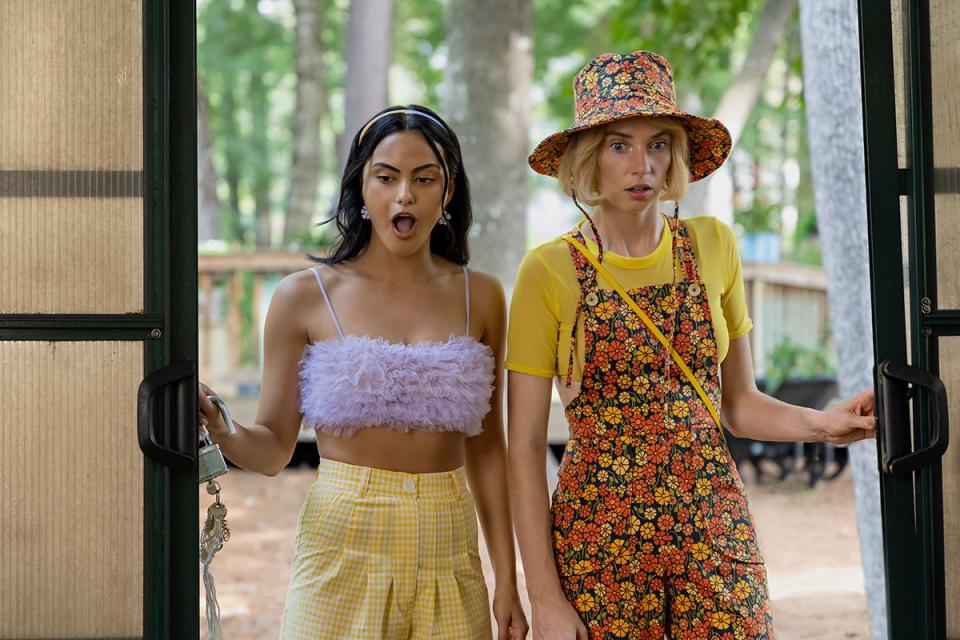How Do Revenge Brings Hitchcock to High School

- Oops!Something went wrong.Please try again later.
- Oops!Something went wrong.Please try again later.
It’s almost hard to believe that Do Revenge was released today. It isn’t that the movie—streaming now on Netflix—feels in any way dated, but more that it feels almost timeless. There’s a reason for that. Early on in the creative process, Jennifer Kaytin Robinson (Someone Great, Thor: Love and Thunder) who co-wrote and directed the dark comedy, zeroed in on something that’s been true of great high-school movies from Clueless to Cruel Intentions: “they’re all reimaginings,” she says, noting that Clueless is a version of Jane Austen’s Emma and Cruel Intentions offers a ’90s take on Dangerous Liaisons. “I was talking to [producer] Peter Cron, and we started discussing Alfred Hitchcock and Strangers on a Train, and that’s where things really clicked into place for me,” she says.
In Do Revenge, Camila Mendes and Maya Hawke star as high school students who’ve been mistreated and decide to team up in order to exact vengeance against each other’s foes—only things don’t go exactly as planned. It’s a smart, acid-tongued take on the eternal desire for two wrongs to make a right, and also a love letter to the teen movies of Robinson’s own high school years and the ways they helped shape her. “I like a movie that feels popcorn,” she says, “but I also want to connect.”

Below, she talks to T&C about high school, mean girls, and her own take on getting even.
When did you first decide to set a story like this in high school?
It happened in the post-production process of my first film, Someone Great. I was thinking about how I’d love to make that kind of movie because it really doesn’t exist anymore—that glossy, campy, fun, kind of outside-of-reality teen movie. And the conceit of Strangers on a Train could be set beautifully in the high-school ecosystem.
Do Revenge is a teen movie, but it’s also commenting on teen movies. What’s your relationship to the genre?
The reason why those movies hold such a place in my heart, and why high school movies are evergreen, is because high school is an ecosystem that mirrors the real world, but it’s not the real world. So, you can take things to a larger-than-life place while still telling a grounded, emotional story. Being young is, in its ethos, about being big and loud and taking up space. Movies like Jawbreaker or Heathers were touchstones in terms of tone and being able to use a wacky premise to portray an emotional journey that feels true for being a teenager. That final scene in Scream, which was another tonal touchstone for me, does such a good job of that meta, fun dialogue where you can put a character in a heightened situation; Matthew Lillard’s character gets stabbed and he says, “my parents are going to be so pissed.” That world and the feeling of those moments is what I connect to and stays with me; they’re emotionally grounded and incredibly cinematic.

There’s also a kind of eternal truth about high school kids—no matter when—and how they’re trying to figure out who they are.
Something that felt exciting for me and Celeste Ballard, who co-wrote the film with me, is subverting expectation. We were able to interrogate both sides of each character because this movie is so much about the masks we wear. It wasn’t just about creating archetypes but real characters; what are they putting out there for people to experience, but also who are they inside? All of the characters have moments when their masks come off and you see that they’re also just a kid trying to figure it out. It was important to us to make these characters incredibly nuanced.
Writing for high-school characters can be tricky. They’re smart but they’re not just small adults. How do you strike that balance?
It’s the writing. Celeste and I both came to the script wanting it to have its own language. We didn’t want to use language that was popular in the moment we were writing, because by the time the movie came out it would be dated. We wanted to live in this world where we could build a lexicon of our own. The other side of this is performance, and working with the actors who are this age, letting them take this dialogue and make it their own. The writing is really fun, and we wanted it to feel of this world, but we also trusted the cast to execute or enhance that dialogue to be the best version of it.
You’re a writer, a producer, and a director on this project. Why wear so many hats?
I don’t know how to let something go. That’s not something I can do. When it’s something I’ve birthed out of my brain, it’s something I want to take all the way to the finish line. I can see a movie as I’m writing it, and so much of putting together a script is me thinking about what songs will play, what the costumes and hair and makeup will look like, and really creating a world in my head.

What type of teenager were you?
I was a bitch, but I was wounded. I had my own trauma that I wasn’t dealing with, and instead of doing that I paid the meanness I was experiencing forward. I look back on that with a lot of regret, but also you really interrogate how and where you grew up. I had a wonderful family but went to a hyper-competitive private school, and it really is interesting to see how your environment can morph your personality. My high-school experience was something I wanted to find ways to eke into this film in terms of the emotional story.
To write this film, did you attempt to immerse yourself in contemporary teen culture?
In Do Revenge, the characters aren’t on their phones the whole time, which was a specific choice. I wanted it to feel kind of outside of reality and the space and time we live in now. I’m on TikTok, I’m on social media, so I’m taking things in almost by osmosis, but I didn’t do the [Clueless director] Amy Heckerling thing and walk around Beverly Hills High School to do an anthropological dig into teen life. This movie was never meant to be a slice of teen life today, it was always meant to be in a heightened reality.
What’s your own relationship with revenge? Should your enemies be scared of you?
Yes! My first television show, Sweet/Vicious, was about a young woman who was sexually assaulted and then becomes a vigilante, exacting justice on her own terms before she realizes that’s not the way to feel better. This movie is about revenge, but really about the wrong way to get to the right answer. These things won’t heal us; therapy will heal us and time will heal us. I like these fun, pulpy revenge stories as a way to actually say something about healing trauma.
You Might Also Like

